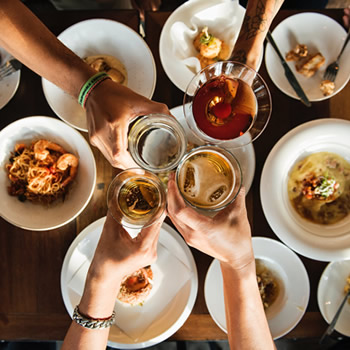 A recent article in the National Post about the real risks of “middle-age spread” talked about how our bodies tend to burn calories slower as we age.
A recent article in the National Post about the real risks of “middle-age spread” talked about how our bodies tend to burn calories slower as we age.
That deficit starts to accumulate as young as age 20, at about 15-20 calories a year.
“By the age of 50, we could be burning nearly 400 fewer calories a day. If you’re still eating the same amount of food as when you were 20, you’ll gain weight,” said Arya Sharma, professor of medicine at the University of Alberta and the scientific director of Obesity Canada.
During the holiday season, it doesn’t take long for 400 calories to disappear from a plate or a bowl of nog. Heck, it doesn’t take long for a thousand calories from that tray of squares and cookies.
That’s not to say that you shouldn’t enjoy yourself. The challenge is to enjoy that family breakfast of walnut-encrusted cinnamon buns on one day, but not all week. Go for seconds on that family dinner, but don’t live on the high-carb, high-fat leftovers for days afterward.
The same goes for alcohol – however you consume it, alcohol is the very definition of empty calories that add up fast.
This isn’t rocket science
How weight gain occurs isn’t rocket science – you consume more calories than you burn through physical activity. We each have a basal metabolic rate (BMR) – the base number of calories our bodies will burn in a typical 24-hour cycle even if we are at rest the whole time. Everyone’s is different, depending on age, gender, height and weight. You can find many different calculators online.
Whatever your BMR, it’s safe to say that a typical holiday routine that includes that breakfast, those snack trays, those beverages and, finally, that big meal with desserts, will yield a calorie count that far exceeds what your body needs for fuel that day. And unused caloric energy is stored as fat.
But say the next day you go to the gym or take a long brisk walk, and skip the desserts, the breads, and the gravies. In other words, cut back on what you eat and exercise enough so that on this day, you burn more calories than you consume.
The net result can be that you break even – restraint on that one day offsets the over-indulgence of the other.
Like we said, this calorie puzzle isn’t rocket science. Though we do acknowledge it can be tricky to follow a routine when the kids are off from school, holidays fall in the middle of the week and you have all those social commitments.
A few tips to consider
- Don’t eat in front of the TV.
- Exercise first thing in the morning before the day gets away from you.
- Stop eating when you feel full.
- Leftovers can be frozen.
- Drink lots of water and don’t forget about fibre.
And get some quality sleep and rest
Other factors that impact how well your body burns calories (and fat) relates to your stress levels and your sleep patterns. Elevated stress and poor sleep both conspire to make it easier for your body to gain weight and hold on to fat, as well as crave those high-calorie and nutritionally deficient treats.
So don’t miss the opportunity over the holidays to get more rest and step away from the hassles of work. Avoid the temptation to stay up late to “watch just one more episode.” It’s much better for your body and for your brain to maintain the same sleep schedule, even when you don’t have to get up early for work or to get the kids off to school.
